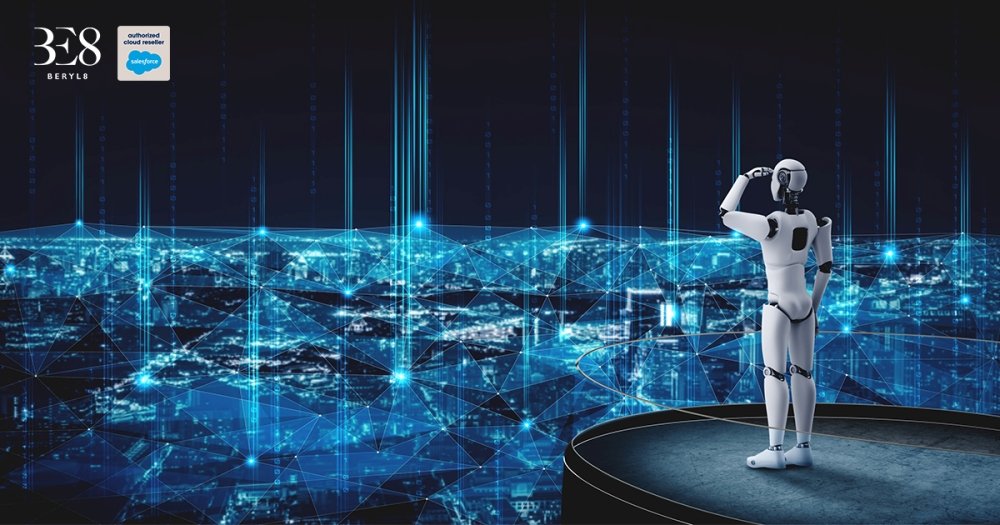What is Enterprise AI? Definition, Examples & More..

What is Enterprise AI?
Enterprise AI is an artificial intelligence and machine learning–based solution that aims to enhance your business functions, such as data collection and analysis.
Simply put, enterprise AI takes all your company information and makes the most out of it, presenting it in a format that’s easy to understand by anyone. As a result, you experience a boost in employee productivity and streamline routine tasks through automation, which enhances your customer service and supply chain workflows, for example.
Enterprise AI doesn’t work alone, however. It employs different technologies to solve challenges, including natural language processing (NLP), machine learning, and computer vision.
But is enterprise AI that different from regular AI? For the answer to this question, follow us in the next section.
What’s the difference between enterprise AI and regular AI?
The main difference between enterprise AI and regular AI is its purpose.
Enterprise AI’s focus is on solving complex problems within large companies. Its main goal is to automate business processes and generate valuable and actionable insights from large volumes of data.
Moreover, it’s highly customizable to meet the specific needs of a business, involving custom algorithms, data models, and even integrations with other existing tools.
Regular AI, on the other hand, has a more general purpose without being highly customizable. You can’t tailor it to a specific use case or industry and it aims to perform specific tasks, such as generating images or coming up with ideas.
In conclusion, enterprise AI works to solve business-related problems, while regular AI is more general.
To drive this point further, let’s look at some examples of enterprise AI.
What are Some Examples of Enterprise AI?
Enterprise AI is super versatile. For example, you can enhance your customer experience using AI-powered chatbots and other assistants, to handle user inquiries and tickets. It can go as far as optimizing cybersecurity and helping businesses make data-driven decisions.
But let’s go through some of the best examples and use cases of enterprise AI in more detail:
- Supply chain management: Enterprise AI helps providers in the supply chain industry reduce costs and increase their ability to respond to sudden changes in demand. How? By spotting potential bottlenecks and optimizing inventory.
- Personalized marketing: Since enterprise AI analyzes preferences and behaviors, it can create more targeted and tailored recommendations or advertisements.
- Enterprise AI search: Enterprise search refers to an employee’s ability to search across their company’s internal knowledge and quickly find what they’re looking for. There are plenty of enterprise AI search tools out there, but one of the best ones is Sleasforce Agentforce. This solution connects all your apps, chats, and docs in a single source of truth. And gives you the responses you need without sorting through irrelevant results.
- Human resources management: Enterprise AI automates many HR tasks like onboarding new hires, screening resumes, and matching candidates. It also helps identify new training opportunities and create the best retention strategy.
Still, should you really use enterprise AI? Like any other tool, enterprise AI has its advantages and disadvantages. Let’s look over them.
What are the Advantages and Disadvantages of Enterprise AI?
Enterprise AI software can change the way you run your business through automation — and take it to new heights.
But where there’s good, there’s also bad.
Let’s look at both and uncover enterprise AI’s advantages and disadvantages.
Key advantages of enterprise AI
Here are enterprise AI’s most essential benefits:
- Streamlines operations: This is the main purpose of this tool and it does so by automating routine tasks, improving your workflows, and aiding your digital transformation. As a result, you’ll experience an increase in productivity and efficiency.
- Improves security: Since enterprise AI handles big data, it should have security best practices and measures in place to protect it from breaches. Good enterprise AI tools have efficient ways to detect and respond to threats.
- Manages data better: Enterprise AI eats data for breakfast. It’s able to analyze large volumes of information quickly, sort it, and help your decision-making process.
- Boosts customer relationships: Nearly 64% of business owners think that AI will improve customer relationships. And it does! Through AI chatbots, people can discover relevant information quickly. In turn, it enhances their experience and strengthens relationships.
Now, let’s go over to the dark side.
Key disadvantages of enterprise AI
Here are the disadvantages of using enterprise AI:
- Requires careful consideration: Unfortunately, you can’t just say you want to implement the tool and that’s it. This decision requires careful consideration as well as management.
- Ethical concerns: If not designed properly, the enterprise AI tool will raise ethical concerns about its use. Many people feel like the data generated by AI isn’t accurate, but they also have concerns about the use of sensitive information.
- Data privacy and security issues: Even if the tool you select has the best security measures in place, incidents happen, which can impact your reputation and sow mistrust.
In the next part of this guide, let’s focus more on enterprise AI platforms. But before we get to the best tools to use, let’s define the concept.
What are Enterprise AI Platforms?
Enterprise AI platforms or enterprise AI software represent a technology that acts as a data management solution for large enterprises. It uses machine learning models to increase operational efficiency by analyzing structured and unstructured data from various sources and making sense of it.
Or rather, turning it into actionable insights that improve your decision-making.
In a nutshell, it’s a unified central database equipped with all the necessary tools for analyzing large datasets in order to create a dynamic business and reduce operational costs.
What is the Future of Enterprise AI?
AI technology could generate $15.7 trillion in revenue by 2030, boosting the GDPR of local economies by 26%. The digitalization of large-scale companies is here, characterized by advanced digital technologies such as the Internet of Things (IoT), blockchain technology, and edge computing.
The integration with other technologies will enhance enterprise AI’s ability to analyze enormous amounts of data in real time more efficiently. In addition, it’ll bolster security and transparency, which increases the trust in artificial intelligence solutions. Overall, the enterprise AI market will continue to grow, reaching $270.06 billion by 2032.
The AI tool will make you forget traditional search and make it infinitely better. In no time, you’ll say ‘goodbye’ to context-switching and access all your data directly in your workflow.
Interested in exploring Enterprise AI or implementing it in your organization? Reach out to our team of experts by clicking here.
Source: getguru



